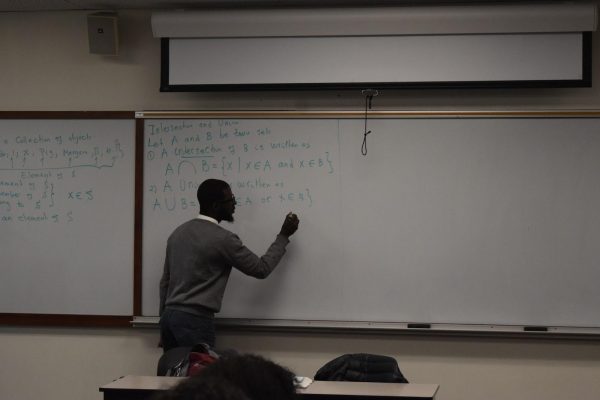Faculty Faces: Cheikhna Mahawa Diagana
Diagana has had a lifelong passion for education, regardless of circumstance. (COURTESY OF ALEXA SPECIALE/THE OBSERVER)
February 28, 2018
Malcolm X once said, “Education is our passport to the future, for tomorrow belongs to the people who prepare for it today.” For Fordham professor Cheikhna Mahawa Diagana, education has been the driving force of his life. From enduring torture in his home country of Mauritania to teaching mathematics at universities all over New York City, his driving force has always been education.
Diagana’s fight for education began when he was about 16 years old in Mauritania, located above Mali and Senegal in western Africa. Diagana took it upon himself to teach Arabic to the Mauritanian people, who had been deprived of the education they wanted. However, the Mauritanian government believed learning Arabic was a sign of defiance. They believed Diagana’s reason for educating was to turn the people against the government. Because of this, Diagana was tortured and beaten. According to CNN, Diagana was beaten by police who “shoved a rifle butt into his mouth, forced him to stare at the sun and beat him when he was unable to keep a cockroach within a small circle, using a stick.” Diagana said he “never gave up,” but ultimately had to leave the country to protect his family. He admitted he could have withstood the torture in order to continue teaching, but he would not allow his family to suffer for his actions.
After fleeing Mauritania, Diagana chose to seek refuge in America. For six months, he learned English and tried to adopt American culture. It was not an easy feat. During this time of transition, Diagana was fortunate enough to take part in New York University’s Program for Survivors of Torture at the Bellevue Hospital Center. There he met people from Africa, Asia and Europe. They were provided with a safe space where they were able to talk about the atrocities they had faced. It was a lifesaving tool to meet others who “shared the same ideology and shared the same experience” as him.
“The individuals who come to us are among the most traumatized and brutalized individuals there are,” said Dr. Allen Keller, who founded the program in 1995. “But they also come to us with incredible resilience, and we have the opportunity to help them heal.”
After these six months, Diagana returned to his pursuit of education. He wanted to give knowledge to the American youth, like he gave to the Mauritanian people.
Why education? Learning and teaching are two things that Diagana admitted to being extremely passionate about. He feels that education is people’s “only way to fight for their own justice.” Although he loves many different subjects and would also like to teach philosophy, Diagana chose math for specific reasons. “Lots of kids struggle with math,” he said. This gives him the ability to help as many people as possible. With the subject’s concrete ideas and Diagana’s passion, he has the ability to help students overcome challenges and aid in their success.
Today, Diagana is a mathematics professor at New York University and part-time professor at both Fordham University and City University of New York. His students at each university mean a great deal to him. “I see students as projections of myself,” he said. In this way, Diagana strives to provide his students with what he could not provide himself. “What I could not receive, I give to them.”
Diagana has advice for those pursuing their education: “One: don’t give up. Two: be patient … Be honest of learning, be passionate, be open-minded,” Diagana said. “Work harder, don’t make excuses and be honest of yourself.” His main point was to accept criticism. “Just because you receive criticism,” he said, “doesn’t mean it’s offensive. It tells you exactly who you are. It defines your character. The more criticism, the more you take in, the more you define yourself.”
Check out Fordham students weighing in on Professor Diagana’s values of education here.
Despite the horrors that Diagana has faced, he does not have any regrets. “Other people have regrets because they say it’s in the past.” He chooses to address his past by living in the present rather than dwelling on previous circumstances. “There’s no place for regret,” Diagana said.
Looking back on his journey as an educator, Diagana had some thoughts about success. “Success is defined individually,” he said. He considers success as whatever one achieves, whether it is big or small. “Don’t compare yourself to others because you think they are ‘successful.’ Success is not measurable, it’s a feeling,” said Diagana. Diagana considers himself successful because he is “internally happy,” and happiness is a success. He believes if you have everything, but life still leaves you unsatisfied then you’re not successful, you just accumulate natural items.
Diagana’s experiences forced him to grow up and mature faster than the average 16 to 18 year old. Nonetheless, they have allowed him to gain strength, move forward and educate others going through similar circumstances. To others experiencing oppression he said, “Do not revendicate against your oppressor. Don’t go back to the past, but instead use your knowledge, wisdom and education to solve it. Don’t let them come to power again.”
Cheikhna Mahawa Diagana is an amazing example of learning from the past and taking steps to build a brighter and stronger future. Despite the horrors he faced, he never lost sight of his goal to educate others. He recognizes that teaching is more than the topics out of a textbook; it is about the lessons to remember for life. Through knowledge comes power and justice. Diagana will do whatever he can to allow others this capacity for influence in the world.










